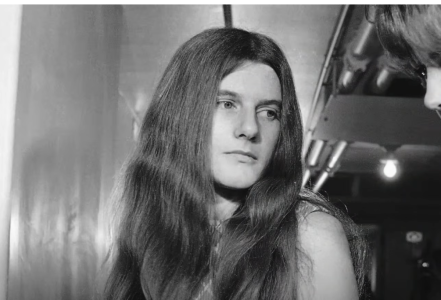After more than 5 decades, will one of the Manson killers be set free?
By
Veronica E.
- Replies 7
For those who remember the summer of 1969, the name “Manson” still carries a deep chill.
It was a time when the nation was gripped by fear, and one of the most horrifying murder sprees in American history unfolded in Los Angeles.
Now, more than 50 years later, that story is back in the headlines—Patricia Krenwinkel, a central figure in the Manson Family, has been recommended for parole by a California prison panel.
At 77, Krenwinkel is the longest-serving female inmate in California history.
Her possible release has reignited a complex public debate about whether someone involved in such brutal crimes can ever truly be rehabilitated.

A haunting past: the crimes that shocked a nation
In 1969, Charles Manson—an ex-convict turned cult leader—manipulated a group of mostly young followers into believing he was a messianic figure.
Living communally on an abandoned movie set, the “Manson Family” used drugs, manipulation, and fear to control its members.
Manson told his followers a race war was coming, and that they would help trigger it.
He called it “Helter Skelter.”
Krenwinkel, who was just 19 when she met Manson, followed him blindly.
In August 1969, she took part in two nights of gruesome murders.
Among the victims: actress Sharon Tate, who was eight months pregnant, and Leno and Rosemary LaBianca.
Krenwinkel later confessed to chasing and stabbing Abigail Folger at Tate’s home.
The next night, she helped kill the LaBiancas—and then, in a disturbing twist, wrote “Death to Pigs,” “Rise,” and “Healter Skelter” in the victims’ blood on the walls.
As she once explained, “Manson told me to do something witchy.”
She was convicted of seven counts of murder and sentenced to life in prison in 1971.
Manson died behind bars in 2017.
Also read: Crazy courtroom drama: Man from Las Vegas jumped a desk and got sentenced to over 20 years in prison!
Parole recommended after decades in prison
Krenwinkel is incarcerated at the California Institution for Women.
She has been denied parole more than a dozen times, most recently in 2022, when Governor Gavin Newsom reversed a prior recommendation.
At the time, Newsom wrote: “Ms. Krenwinkel fully accepted Mr. Manson’s racist, apocalyptical ideologies. She was not only a victim of his abuse, but also a significant contributor to the violence and tragedy that became the Manson Family’s legacy… She played a leadership role in the cult, and an enforcer of Mr. Manson’s tyranny.”
But on Friday, a California parole panel saw things differently.
After a four-hour hearing, they determined that Krenwinkel poses a low risk of reoffending, citing her advanced age and decades of good behavior and rehabilitation work in prison.
“You have made strides,” said Commissioner Gilbert Infante, addressing Krenwinkel.
“This decision does not minimize or forgive the criminal conduct or the loss your victims and their families have suffered. But when we look at your subsequent growth, it is evident in the work you have done.”
Also read: The tragic betrayal: Georgia man sentenced to life for wife’s murder after 18-month manhunt
Voices of opposition remain strong
Krenwinkel did not speak during the hearing.
But Debra Tate, sister of Sharon Tate and a longtime opponent of parole for any Manson Family member, made her position clear:
“Releasing her to society puts society at risk. I don’t accept any explanation for someone who has had 55 years to think of the many ways they impacted their victims, but still does not know their names. My life, the victims’ families are forever affected.”
Her testimony echoed the ongoing pain that survivors and loved ones have carried for more than five decades.
Also read: Teen who wept for grandfather turns killer—inspired by a TV show!
What happens next
The panel’s recommendation now goes to the full California Board of Parole Hearings for review, which must be completed within 120 days.
If they uphold it, Governor Newsom will have 150 days to either affirm, reverse, or take no action.
Given his previous statements, the final outcome remains uncertain.
A larger debate about justice and redemption
Krenwinkel’s case is part of a broader national conversation about how we treat aging inmates—especially those convicted of infamous crimes.
California law now requires parole boards to consider age, health, and evidence of rehabilitation.
Supporters say incarceration should allow for personal growth and eventual redemption, particularly when someone has served over five decades.
Critics argue that some crimes are simply too brutal to ever warrant release, and that the trauma to victims’ families should never be forgotten.
Read next: Women’s health breakthroughs at stake—what you need to know about the fight to save this major initiative

Do you believe someone like Patricia Krenwinkel can ever truly change? Should time and remorse make a difference in cases like this—or are some crimes too grave to forgive? Share your thoughts in the comments—we’d love to hear your perspective!
It was a time when the nation was gripped by fear, and one of the most horrifying murder sprees in American history unfolded in Los Angeles.
Now, more than 50 years later, that story is back in the headlines—Patricia Krenwinkel, a central figure in the Manson Family, has been recommended for parole by a California prison panel.
At 77, Krenwinkel is the longest-serving female inmate in California history.
Her possible release has reignited a complex public debate about whether someone involved in such brutal crimes can ever truly be rehabilitated.

Patricia Krenwinkel, now 77, was a central figure in the Manson Family murders and is currently the longest-serving female inmate in California. Image Source: YouTube / CBS 8 San Diego.
A haunting past: the crimes that shocked a nation
In 1969, Charles Manson—an ex-convict turned cult leader—manipulated a group of mostly young followers into believing he was a messianic figure.
Living communally on an abandoned movie set, the “Manson Family” used drugs, manipulation, and fear to control its members.
Manson told his followers a race war was coming, and that they would help trigger it.
He called it “Helter Skelter.”
Krenwinkel, who was just 19 when she met Manson, followed him blindly.
In August 1969, she took part in two nights of gruesome murders.
Among the victims: actress Sharon Tate, who was eight months pregnant, and Leno and Rosemary LaBianca.
Krenwinkel later confessed to chasing and stabbing Abigail Folger at Tate’s home.
The next night, she helped kill the LaBiancas—and then, in a disturbing twist, wrote “Death to Pigs,” “Rise,” and “Healter Skelter” in the victims’ blood on the walls.
As she once explained, “Manson told me to do something witchy.”
She was convicted of seven counts of murder and sentenced to life in prison in 1971.
Manson died behind bars in 2017.
Also read: Crazy courtroom drama: Man from Las Vegas jumped a desk and got sentenced to over 20 years in prison!
Parole recommended after decades in prison
Krenwinkel is incarcerated at the California Institution for Women.
She has been denied parole more than a dozen times, most recently in 2022, when Governor Gavin Newsom reversed a prior recommendation.
At the time, Newsom wrote: “Ms. Krenwinkel fully accepted Mr. Manson’s racist, apocalyptical ideologies. She was not only a victim of his abuse, but also a significant contributor to the violence and tragedy that became the Manson Family’s legacy… She played a leadership role in the cult, and an enforcer of Mr. Manson’s tyranny.”
But on Friday, a California parole panel saw things differently.
After a four-hour hearing, they determined that Krenwinkel poses a low risk of reoffending, citing her advanced age and decades of good behavior and rehabilitation work in prison.
“You have made strides,” said Commissioner Gilbert Infante, addressing Krenwinkel.
“This decision does not minimize or forgive the criminal conduct or the loss your victims and their families have suffered. But when we look at your subsequent growth, it is evident in the work you have done.”
Also read: The tragic betrayal: Georgia man sentenced to life for wife’s murder after 18-month manhunt
Voices of opposition remain strong
Krenwinkel did not speak during the hearing.
But Debra Tate, sister of Sharon Tate and a longtime opponent of parole for any Manson Family member, made her position clear:
“Releasing her to society puts society at risk. I don’t accept any explanation for someone who has had 55 years to think of the many ways they impacted their victims, but still does not know their names. My life, the victims’ families are forever affected.”
Her testimony echoed the ongoing pain that survivors and loved ones have carried for more than five decades.
Also read: Teen who wept for grandfather turns killer—inspired by a TV show!
What happens next
The panel’s recommendation now goes to the full California Board of Parole Hearings for review, which must be completed within 120 days.
If they uphold it, Governor Newsom will have 150 days to either affirm, reverse, or take no action.
Given his previous statements, the final outcome remains uncertain.
A larger debate about justice and redemption
Krenwinkel’s case is part of a broader national conversation about how we treat aging inmates—especially those convicted of infamous crimes.
California law now requires parole boards to consider age, health, and evidence of rehabilitation.
Supporters say incarceration should allow for personal growth and eventual redemption, particularly when someone has served over five decades.
Critics argue that some crimes are simply too brutal to ever warrant release, and that the trauma to victims’ families should never be forgotten.
Read next: Women’s health breakthroughs at stake—what you need to know about the fight to save this major initiative
Key Takeaways
- Patricia Krenwinkel, a member of the notorious Manson Family cult convicted of multiple murders in 1969, has been recommended for parole by a California prison panel after more than five decades in prison.
- Krenwinkel, now 77 and California’s longest-serving female inmate, was deemed a low risk to reoffend due to age and good behavior, though the decision still requires final review and the governor’s approval.
- Family members of victims, including Sharon Tate’s sister Debra Tate, strongly opposed the recommendation, citing the ongoing trauma caused by the crimes.
- The panel acknowledged Krenwinkel’s rehabilitation but emphasized that it does not excuse or minimize the horror of her actions or their lasting impact.
Do you believe someone like Patricia Krenwinkel can ever truly change? Should time and remorse make a difference in cases like this—or are some crimes too grave to forgive? Share your thoughts in the comments—we’d love to hear your perspective!






